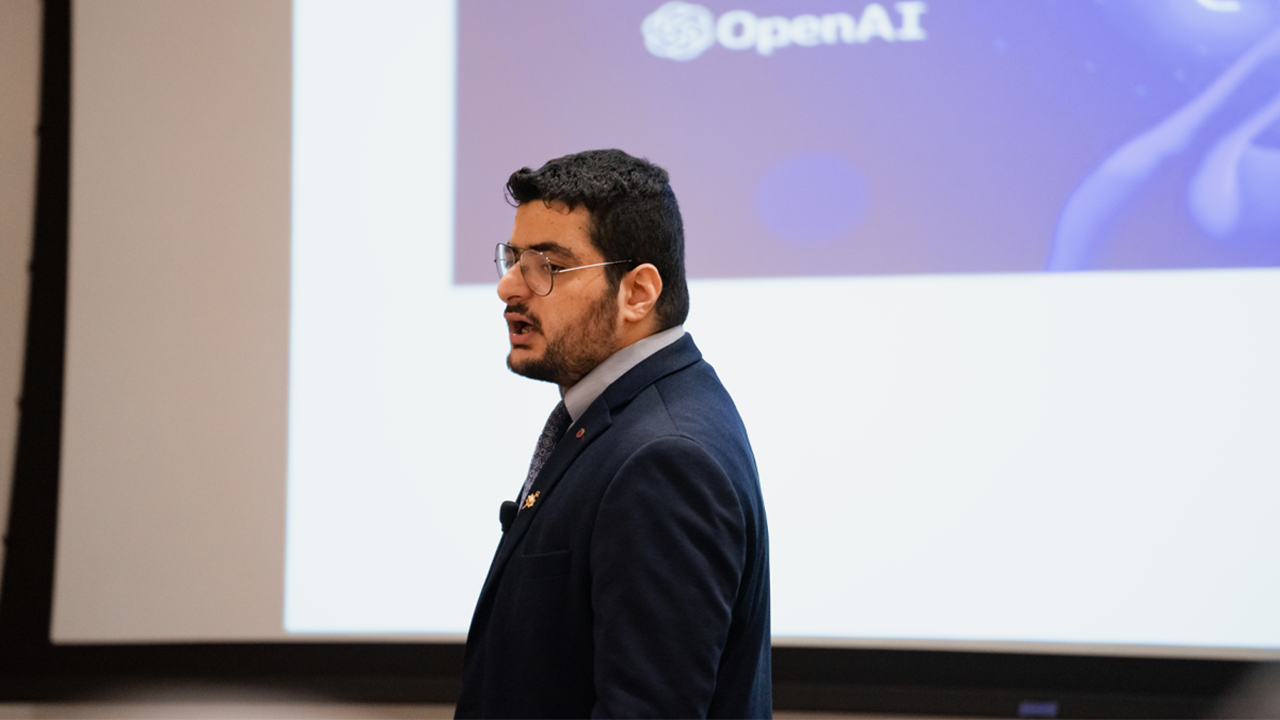USD Computer Science Expert Dives into ChatGPT

As a professor and researcher with an extensive background in artificial intelligence (AI), Rodrigue Rizk, Ph.D., assistant professor of computer science at the University of South Dakota, has vast experience in the field of transformers and natural language processing – the technologies that make ChatGPT possible.
Over the course of his academic and professional career, Rizk has worked on a variety of projects related to transformers and has published numerous papers on the topic. He has also taught several courses at USD on related topics and has supervised students working on research projects related to transformers.
We asked Rizk to further explain this emerging technology, what it means for the future of AI and how it will influence the way people interact with technology and each other. This is what he had to say.
Can you tell us a little bit more about ChatGPT and what it does?
The key thing that makes ChatGPT special is that it’s built on a technology called a transformer model, which allows it to process language as a sequence of words and capture more complex relationships between them. This makes it much better at generating nuanced and varied responses that feel like they’re coming from a real person.
ChatGPT, in particular, is a pre-trained transformer model that is designed to generate human-like responses to natural language queries or prompts. You can think of ChatGPT as a very smart and sophisticated chatbot or virtual assistant. You can ask it questions or give it prompts, and it will generate a response that's often very natural-sounding and contextually appropriate. For example, you could ask ChatGPT for the weather forecast, to tell you a joke or even to have a philosophical discussion.
What is the importance of this new technology?
ChatGPT and other transformer models represent an exciting advancement in the field of AI and have the potential to revolutionize the way we interact with machines and each other using natural language. They use self-attention mechanisms to better capture long-range dependencies in text and make sense of the entire context of a sentence.
ChatGPT is trained using vast amounts of text data and is designed to understand and respond to human language in a conversational way. This has important implications for a wide range of applications and a significant impact on many different industries and areas of research.
What kind of an impact will ChatGPT have in the near future? How do you see it influencing different industries?
The impact of ChatGPT and transformers is already being felt in a variety of industries and applications, and we can expect this trend to continue in the near future. Here are a few ways that I think these technologies are likely to have an impact:
- Better language-based AI assistants: With the help of transformers and ChatGPT, AI assistants such as Siri, Alexa, and Google Assistant can become more sophisticated in their language understanding and more capable of generating human-like responses to user queries. They may become more integrated into our daily lives. We may be able to use them to automate tasks, schedule appointments and even make purchases on our behalf.
- More personalized content: ChatGPT and transformers can be used to create personalized content such as news articles, product recommendations and marketing messages, based on the interests and preferences of individual users.
- Advances in medical research: Transformers and ChatGPT can help researchers analyze large amounts of medical data and identify patterns that may be useful for diagnosing and treating diseases.
- Enhanced cybersecurity: Transformers and ChatGPT can help improve cybersecurity by analyzing large amounts of text data to identify patterns of suspicious behavior or potential security threats.
- New business opportunities: The ability to generate high-quality, natural language text has the potential to create new business opportunities in a variety of industries, including customer service, marketing and education.
- Improving Customer Service: Companies are already using ChatGPT and other conversational AI tools to improve their customer service. In the future, we may see even more sophisticated chatbots and virtual assistants that can handle complex inquiries and provide personalized recommendations. ChatGPT and transformers have the ability to transform how humans communicate with AI, exchanging information beyond simple robot-like instructions and commands.
- Creative Industries: ChatGPT and transformer models can be used to generate content such as articles, music and art.
Are any flaws or potential issues with this new technology?
It is worth noting that while ChatGPT and transformer models have many exciting applications and possibilities, there are also important ethical considerations to keep in mind. As with any new technology, it is important to consider the potential impacts of these models on society and to think carefully about how they are developed and used.
Why is it important for people to learn more about ChatGPT and stay up to date with new technological advancements?
Regardless of your background or area of interest, there is likely something to be gained from learning more about these exciting new technologies. These cutting-edge technologies have the potential to transform the way we communicate with machines and will take over many fields and sectors.
We should stay up to date with the latest developments and advancements, seize any opportunity to learn, grow and stay ahead of the curve. If history has taught us anything, it is that if we don’t ride the wave, we lose!
